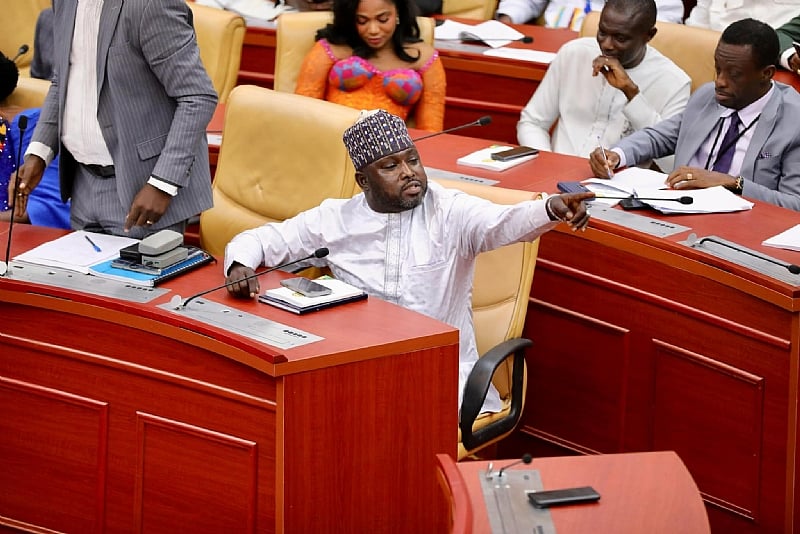The Ghanaian political landscape has been stirred by the recurring inability of the ruling National Democratic Congress (NDC) to muster the required quorum of 91 Members of Parliament (MPs) to conduct business in the chamber. This persistent failure, despite the NDC holding a comfortable majority with 183 seats, plus the support of four independent MPs, totaling 187, has sparked concerns and criticism, particularly from the opposition New Patriotic Party (NPP). The NPP’s Minority Caucus has publicly questioned the NDC’s commitment to its legislative duties and highlighted the potential for internal divisions within the ruling party, speculating that this inability to mobilize its members reflects deeper underlying issues. The situation has also drawn attention to the Speaker of Parliament’s role and the broader implications for effective governance in Ghana.
The repeated adjournments of Parliament due to the lack of quorum have fueled the NPP’s arguments against the NDC’s leadership. Habib Iddrisu, the First Deputy Minority Whip and NPP MP for Tolon, has been particularly vocal in his criticism, pointing to the NDC’s failure as a clear indicator of their weakness and lack of dedication to their responsibilities. He argues that the persistent shortfall in attendance, despite their numerical advantage, exposes a lack of control and discipline within the NDC’s ranks and raises questions about their ability to effectively govern. The NPP has capitalized on these parliamentary shortcomings to call for increased accountability and transparency from the ruling party. They contend that the inability to maintain a quorum reflects a broader pattern of ineffective governance and a disregard for the democratic process.
The NDC’s struggles to command a quorum have underscored a broader issue within Ghanaian politics: the underrepresentation of women in parliament. With women comprising only 15 percent of the current parliamentary body, the situation highlights the persistent challenges in achieving gender parity in political representation. While the quorum issue is not directly linked to the gender imbalance, it serves as a reminder of the need for greater inclusion and diversity within the legislative body. The lack of adequate female representation deprives Parliament of valuable perspectives and hinders the development of policies that effectively address the needs of all Ghanaians. Addressing this imbalance is crucial for strengthening democratic governance and ensuring that the voices of all citizens are heard and considered in the legislative process.
The NPP has seized upon the quorum failures as an opportunity to critique the NDC’s overall performance and question their fitness to govern. They argue that the inability to manage their own parliamentary majority reflects a broader lack of competence and undermines the effectiveness of the government. The opposition’s criticisms extend beyond the procedural issue of the quorum, portraying it as symptomatic of deeper flaws within the ruling party. This strategic move aims to erode public confidence in the NDC and position the NPP as a more capable alternative. By consistently highlighting the NDC’s parliamentary struggles, the NPP seeks to gain political leverage and bolster its support base ahead of future elections.
The NDC’s silence on the recurring quorum issue has further fueled speculation and criticism. Their failure to address the concerns raised by the opposition and the public has allowed the narrative of disunity and ineffectiveness to take hold. This lack of communication has created a vacuum that the NPP has readily filled with its own interpretations of the situation. To counter the negative perception and regain public trust, the NDC needs to proactively address the quorum issue, offer explanations for the parliamentary absences, and outline strategies to prevent future occurrences. A transparent and accountable approach is crucial for mitigating the damage caused by this ongoing parliamentary dysfunction.
This situation underscores the critical importance of a functioning parliament for a healthy democracy. The inability of the ruling party to consistently maintain a quorum disrupts the legislative process, delays crucial policy decisions, and undermines the effectiveness of government. It also erodes public trust in political institutions and creates an environment of instability and uncertainty. The NDC’s ongoing struggle to command a quorum raises fundamental questions about its leadership and ability to govern effectively. Addressing this issue is paramount for ensuring the smooth functioning of Ghana’s democracy and maintaining public confidence in its political system. The continued failure to address the quorum issue will likely have long-term consequences for the NDC’s political standing and the stability of the Ghanaian government.


